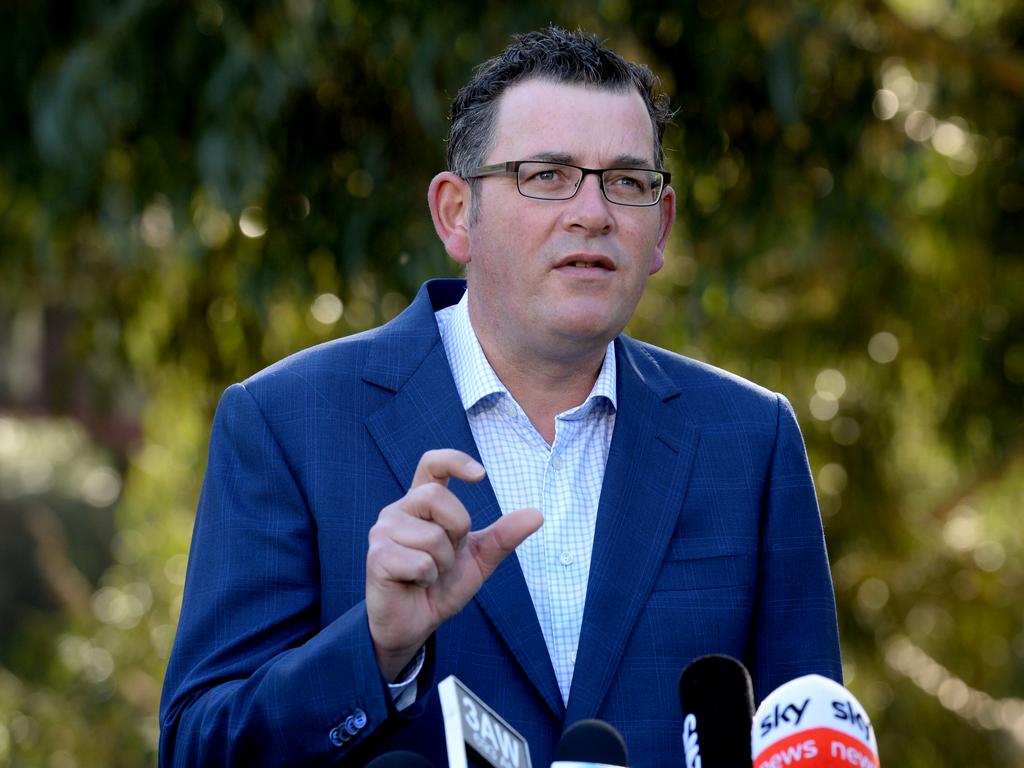Anthony Albanese’s ‘Accord’ for gig workers
National builders have accused the ALP of wanting to ‘unleash union thuggery’ after Anthony Albanese said Labor would abolish the ABCC.

National builders have accused the ALP of wanting to “unleash union thuggery” after Anthony Albanese said a Labor government would abolish the Australian Building and Construction Commission.
As part of Labor’s industrial relations policy to be released on Wednesday, the Opposition leader will promise to scrap the ABCC and the Registered Organisations Commission if he wins the election.
Master Builders chief executive Denita Wawn said “just as governments around the country are putting construction front and centre of their economic recovery plans, Labor is planning to take the leash off construction union thugs and bullies.”
She said the ABCC’s role in upholding the rule of law on worksites was “central to tackling the toxic culture of lawlessness and thuggery deployed by building unions that has plagued the sector for decades”.
“There is absolutely no evidence to support abolishing the ABCC but there is a mountain of evidence to support its retention, including hundreds of Federal Court judgments, countless inquiries and reviews, and four separate Royal Commissions of Inquiry spanning three decades,” she said.
Gig economy workers would be entitled to minimum pay and conditions and “job security” legislated as a key objective of the Fair Work Act, under Labor’s new industrial relations policy that promises an Accord-inspired “compact” with employers and unions.
Ensuring workplace relations will be a major policy battleground at the next election, Mr Albanese will unveil significant policy proposals that would effectively widen the definition of “employee”, bolster the powers of the Fair Work Commission, create a new casual worker test, and allow “insecure” workers to carry leave entitlements into new jobs.
Declaring Labor would not only oppose the Coalition’s industrial relations changes but offer workers a “better deal”, Mr Albanese will promise to guarantee that labour hire workers doing the same job as direct employees are entitled to the same pay, while also limiting the number of consecutive fixed-term contracts an employer can offer a worker for the same job.
“The next federal election will not be a referendum on the coronavirus pandemic, it will be a contest between two very different visions for the future of Australia,” Mr Albanese said.
“A battle for the things which matter most to the Labor Party I lead, and to millions of Australians. Jobs. Good, secure jobs.”
Citing the “prime examples” of the Hawke and Keating governments, Mr Albanese said “the best governments in our history have understood the need for a compact between capital and labour to advance their mutual interests”.
“A government I lead will always respect the central importance of successful businesses as job creators,” he said.
“Governments create the environment that enables business to prosper and create new jobs.
“This requires a partnership between government, business and unions.”

By legislating “job security” as a key objective of the Fair Work Act, he said the commission would be required to bring a sharp focus to job security when making decisions.
“We will legislate to ensure more Australian workers have access to employee protections and entitlements currently denied to them by the narrow, outdated definition of an ‘employee’,” he said.
“We will do this by extending the powers of the Fair Work Commission to include employee-like forms of work, allowing the commission to make orders for minimum standards in new forms of work.
“The most obvious example of what we are talking about here is of course the ‘gig’ or ‘on demand’ economy.” He said gig economy workers were being denied basic rights such as award benefits, superannuation, the right to collectively bargain and access to unfair dismissal protections.
Promising to restore the commission to the “centre” of the workplace relations system, he said “Labor will ensure that the independent umpire has the capacity to inquire into all forms of work and determine what rights and obligations should apply”.
He recommitted Labor to abolishing the “discredited and politicised” Registered Organisations Commission and the Australian Building and Construction Commission.
He said during the “darkest days of the pandemic, one of the most confronting revelations was how many workers — casuals, contractors, gig workers — had no rights at all to paid sick leave”.
Labor would work with state and territory governments, unions and industry to develop portable entitlements for annual leave, sick leave and long service leave for Australians in insecure work. “The economy is evolving. Workplace laws must evolve with it,” he said.
While there were Australians who preferred the option of casual work, the problem arose “when the definition of casual is used and abused to deprive people of pay, leave entitlements or job security”.
“Under a Labor government that I lead, we will legislate to create a fair test to determine when a worker can be classified as a casual,” he said.
Workers employed through labour hire companies should receive at least the same pay as workers employed directly.
“There is a very simple principle to apply here: if you work the same job, you should get the same pay. A Labor government will write that principle into law,” he said.
Labor would also legislate for fixed-term contract limits for the same role of 24 months, or no more than two consecutive contracts, whatever came first.
“Once that limit is reached, the employer will be required to offer a permanent position, either part time or full time,” he said.
He said the policy initiatives spoke to more than a “century of Labor values, and my own lifetime as an advocate for working people”.
“The current government has failed to deliver on its responsibility to ensure that workplace laws have evolved at the same pace as changes in patterns of commerce,” he said.
“These laws can be adjusted in ways that benefit both employers and employees.”
Opposition industrial relations spokesman Tony Burke said the transference of leave entitlements for “insecure” workers would begin incrementally with one industry at a time.
“It’s not something that would just be unilateral legislation through the parliament,” he told the ABC.
“This is something we’ve said we’d negotiate with the states and territories and start working through how we can have portability of entitlements for people.”
Mr Burke said the COVID pandemic had revealed workers with no access to sick leave had a detrimental effect on Australia’s public health system because some employees went to work when unwell.
“It is a reminder that insecure work and people who are compelled to work multiple jobs has effectively meant a whole lot of the standards we thought we had in Australia haven’t reached millions of our workforce,” he said.








To join the conversation, please log in. Don't have an account? Register
Join the conversation, you are commenting as Logout